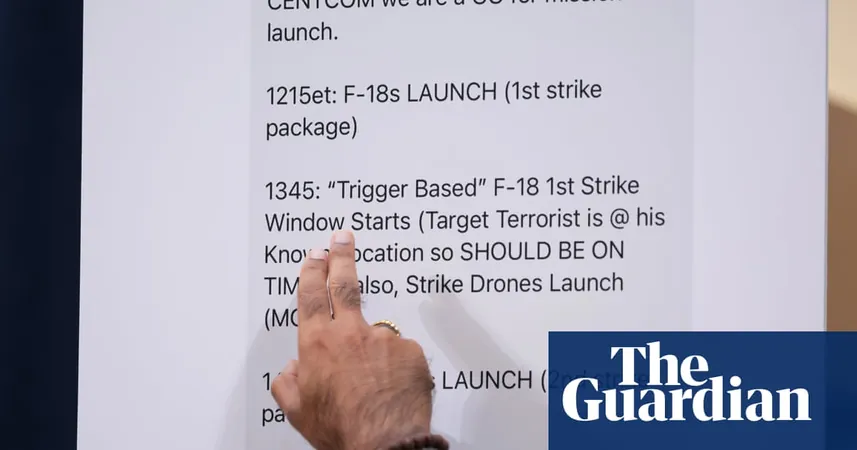
Former Canadian Spy Chief Warns of Security Risks Following U.S. Signal Leak
2025-03-26
Author: Olivia
Concerns Raised Over U.S. Signal Leak
In a troubling turn of events, Richard Fadden, Canada’s former intelligence chief, has voiced serious concerns regarding the Trump administration's handling of a recent leak involving sensitive military information. Fadden argues that the U.S.'s response to the leak poses significant risks to the security of the intelligence-sharing alliance known as the "Five Eyes."
Details of the Leak
The situation intensified after the Atlantic magazine published a detailed account of messages from a group chat that disclosed confidential U.S. military attack plans, including specifics about bombings, drone launches, and operational weather conditions. Alarmingly, the messages were inadvertently shared with a journalist added to the conversation.
Implications for Canada-U.S. Relations
"This situation is very troubling. Canada must assess the implications: Can we trust the United States to safeguard our secrets, just as we are obligated to protect theirs?" Fadden explained during an interview. He noted that while intelligence leaks are not uncommon, the nature of this one—stemming from the highest levels of U.S. government—raises particular alarms, especially considering the administration’s refusal to acknowledge it as a problem.
Strain on the Five Eyes Alliance
The Five Eyes intelligence alliance comprises Canada, the United States, the United Kingdom, Australia, and New Zealand—nations that have cooperated for decades in sharing sensitive information. However, this breach may strain that rapport as partners question the current U.S. administration’s commitment to protecting classified data.
Critique of U.S. Administration's Response
Fadden criticized the administration's dismissive response, suggesting that rather than addressing the issue transparently, U.S. officials appear focused on a political cleanup. "When intelligence breaches occur, we typically own up to it and work to rectify the situation. It is concerning that the impression today is that U.S. cabinet members are unwilling to face the reality of the problem," he remarked.
Diverging Views on Classification of Information
Despite the wealth of detailed information reported by journalist Jeffrey Goldberg, White House officials have maintained that the contents of the messages were not classified. U.S. Secretary of Defense Pete Hegseth emphatically stated, "Nobody was texting war plans," while White House Press Secretary Karoline Leavitt labeled the article a “hoax” from a known critic of Trump.
Concerns Over Messaging Platforms
Fadden continues to dispute this characterization, underscoring the importance of confidentiality in intelligence matters. He wished for a more forthright acknowledgment of mistakes from the U.S. administration, suggesting that such openness could help maintain vital intelligence-sharing relationships.
Implications for Canadian Policy
Adding another layer to the problem, the use of Signal—a commercial messaging platform known for its robust encryption—has come under scrutiny. While Signal is popular among journalists and appears secure, it cannot be used on devices provided by the federal government, leading to possible security lapses as officials likely communicated via private phones. Fadden cautioned that despite Signal's encryption benefits, personal devices remain vulnerable to hacking.
Strained Canada-U.S. Relations
Amid these concerns, Canada finds its relationship with the U.S., its largest trading partner, already strained over economic and political tensions, including Trump's trade policies. Prime Minister Mark Carney alluded to the changing dynamics, asserting that Canada may need to adopt a more self-reliant stance in the face of evolving security challenges.
Looking Ahead
Fadden acknowledged the ongoing political and strategic challenges with the U.S., though he remained hopeful that critical intelligence-sharing could endure. He noted, however, that these leaks may prompt serious introspection among alliance members regarding the protocols for sharing sensitive information.
Future of Intelligence Collaboration
"Discussions about what constitutes 'Canadian eyes only' intelligence will likely emerge, as partners reassess how candidly they can share crucial data,” he stated. “While the Five Eyes will likely weather this storm, adjustments will be necessary in the short to medium term."
Implications for National Security
As this story unfolds, the implications of these leaks raise vital questions about the future of international intelligence collaboration and the safeguarding of national securities.









 Brasil (PT)
Brasil (PT)
 Canada (EN)
Canada (EN)
 Chile (ES)
Chile (ES)
 Česko (CS)
Česko (CS)
 대한민국 (KO)
대한민국 (KO)
 España (ES)
España (ES)
 France (FR)
France (FR)
 Hong Kong (EN)
Hong Kong (EN)
 Italia (IT)
Italia (IT)
 日本 (JA)
日本 (JA)
 Magyarország (HU)
Magyarország (HU)
 Norge (NO)
Norge (NO)
 Polska (PL)
Polska (PL)
 Schweiz (DE)
Schweiz (DE)
 Singapore (EN)
Singapore (EN)
 Sverige (SV)
Sverige (SV)
 Suomi (FI)
Suomi (FI)
 Türkiye (TR)
Türkiye (TR)
 الإمارات العربية المتحدة (AR)
الإمارات العربية المتحدة (AR)